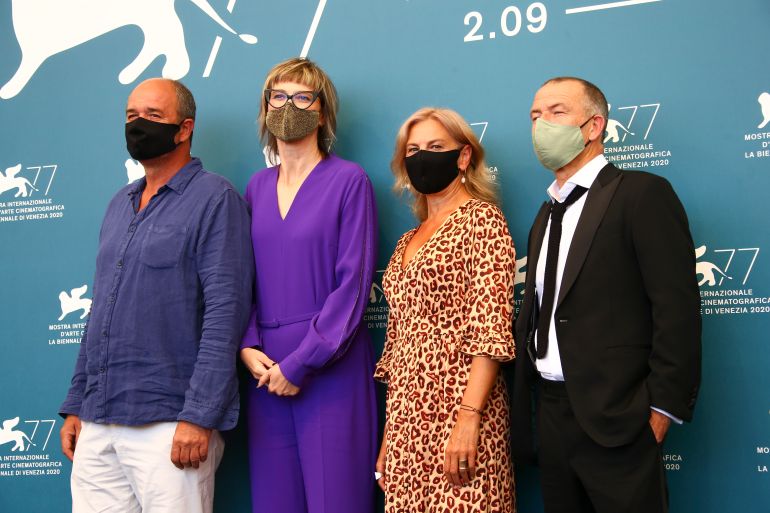Why Quo Vadis, Aida? deserves an Oscar
Jasmila Žbanić’s masterful film asks us to open our eyes, speak up and act to save lives.

Quo Vadis, Aida?, Jasmila Žbanić’s gut-wrenching film about the 1995 genocide in Srebrenica, the end-game of the Bosnian war, is this year’s Bosnian entry for the foreign feature category of the Academy Awards. Directed by Žbanić and produced by her small independent company Deblokada, the film is set to compete against the film industry’s favourite – Another Round, a Danish comedy-drama about male bonding, mid-life crisis, and binge-drinking. The contrast between the worlds that the two films inhabit and represent could not be greater.
In the eyes of those of us who have lived through the horrors of the Bosnian war, Quo Vadis, Aida? is a masterpiece that truly deserves an Oscar.
Keep reading
list of 4 itemsKing Charles unveils royal portrait
Cannes film festival hopes for ‘no controversies’ as wars, scandals rage
Energy summit seeks to curb cooking habits that kill millions every year
It is an intimate film about the mass-scale political violence that took place in Srebrenica, where 8,372 Bosnian Muslim men and boys were killed in what has come to be known as “Europe’s only post-World War II genocide”. What distinguishes genocide from a massacre or a mass shooting, even of a large number of victims, is that it is a premeditated, planned and systematically executed act of violence against a target population.
Quo Vadis, Aida? tackles this all-important distinction remarkably well. The film’s narrative focuses on a fictional Bosnian interpreter for the UN – a local English teacher named Aida played by Jasna Ðuričić – who tries to save the lives of her husband and son.
Many viewers will immediately recognise the references to real events in some of the key scenes: for example, the Bosnian Serb Army under the command of General Ratko Mladić entering the UN-protected “safe zone” and thousands of civilians flocking to Colonel Thom Karremans and his Dutch peacekeeping battalion to seek protection. The actual violence is not depicted in the film – and it does not have to be.
For the film so successfully conveys the sense that everyone knew that the violence was coming yet failed to stop it – that its representation is far more harrowing than any gory visualisation. With incredible intensity, almost never losing sight of Aida’s face, the film threads between hopes and contingencies of survival and the inevitability of genocide; between the urgency to act ahead of the predetermined, deadly, conclusion and the bureaucratic pettiness and inertia of the United Nations. Amid the prevarications of the international community, death – already foretold – finds its ghastly place.
Twenty-five years after Srebrenica, that knowledge of the death foretold but not prevented is still carried – as the film depicts in its haunting post-conflict coda – by the surviving women of Srebrenica.
But as there are carriers of this knowledge, there are also deniers. Today, the certainty of genocide continues to be questioned not only by the politicians in Republika Srpska and Serbia proper, whose power rests on genocide denial, but also by some Western intellectuals. Just two years ago the Swedish Nobel Prize committee shocked genocide survivors by awarding a Nobel Prize to long-term genocide denier Peter Handke. Relabelled as a “massacre”, the Bosnian genocide is also cynically used by the Russian government in its twisted rhetoric threatening the invasion of Ukraine.
The international community’s inaction on the Bosnian and Rwandan genocides prompted it to develop a new international legal infrastructure – first the international tribunals and then, eventually, the International Criminal Court. This led to a re-examinaton of UN peacekeeping operations and the development of new normative frameworks – Women, Peace and Security Agenda and Responsibility to Protect – in order to ensure action is taken on future violence.
But in the politics and geopolitics of the last two decades, those advances were squandered through the disastrous US-led “war on terror”, among other ill-conceived interventions. Action, on behalf of life, once again appears foreclosed.
With incredible dignity, Žbanić’s main character searches for the remains of her husband and sons while teaching the perpetrators’ children in a Srebrenica school. In the closing scene of the film, the children use their hands to cover and uncover their eyes in a school performance, much like the world continues to do in its relation to systemic political violence always imagined to be far away and someone else’s problem.
An Oscar for Quo Vadis, Aida? can signal a determination in the West to honour and privilege human lives when threatened by extermination. Such choices, no doubt, are always political. Throughout the pandemic, many governments have privileged the economy and their own political survival over the lives of their citizens – especially if those citizens have also happened to be under-represented minorities.
Quo Vadis, Aida? asks its viewers not only to uncover their eyes, but also to speak up against wrongdoing. Far from being an appeal for peace and reconciliation, the film is a call for an ethics and politics of responsibility. Quo Vadis, Aida? deserves an Oscar for the mastery of its film language which powerfully represents an unrepresentable event. It deserves an Oscar for the mothers of Srebrenica and the survivors of the genocide who are still fighting to be heard. But it also deserves an Oscar to remind us about the depths of the moral abyss we fall to whenever we fail to prevent violence that has been so clearly foretold.
The views expressed in this article are the authors’ own and do not necessarily reflect Al Jazeera’s editorial stance.